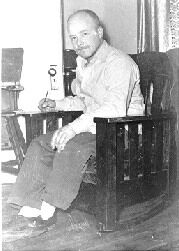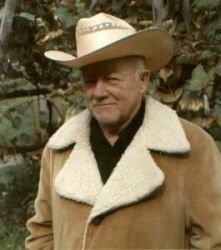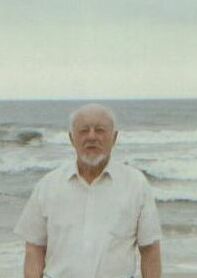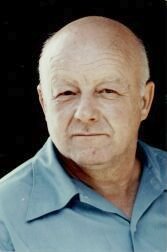Who is Richard Rose?
Author, poet, philosopher, and founder of the
TAT Foundation and the Albigen System.
 Richard Rose (1917 - 2005) is one of the most profound and unusual spiritual teachers this
country has ever produced. A native son from the hills of West Virginia, Mr. Rose underwent a cataclysmic
spiritual experience at the age of thirty that left him with an intimate understanding of the secrets of life and
death. He was often referred to as a Zen Master by the people who knew him because of the
depth of his wisdom and his ability to make direct mind contact with his students. But he did not expound
traditional Zen or any other traditional teachings. What he taught sprang from his personal realization of Truth.
Richard Rose (1917 - 2005) is one of the most profound and unusual spiritual teachers this
country has ever produced. A native son from the hills of West Virginia, Mr. Rose underwent a cataclysmic
spiritual experience at the age of thirty that left him with an intimate understanding of the secrets of life and
death. He was often referred to as a Zen Master by the people who knew him because of the
depth of his wisdom and his ability to make direct mind contact with his students. But he did not expound
traditional Zen or any other traditional teachings. What he taught sprang from his personal realization of Truth.
Though Richard Rose authored several books on esoteric philosophy and had lectured widely in universities across the country, he remained largely unknown. He has been described, in fact, as "The greatest man no one's ever heard of." He appeared in newspaper articles and on local talk shows during lecture tours, and was featured in spiritual journals from time to time, but he was in some ways a throw-back to the stern Zen masters of a thousand years ago, and his hard-edged, uncompromising approach to life and spiritual work is not a path for the easy-going.
From a very early age, Richard Rose was a man on a mission: to find an answer to the great riddle of life. One of his earliest memories was writing over and over in a child's hand, "Many are called, but few are chosen." At the age of twelve, he entered a Capuchin seminary in Pennsylvania to study for the priesthood. He wanted, simply, to find God. After five years he left, however, disenchanted with religious life and the constant admonitions to be content to believe church doctrines, not to seek a personal experience of God.
 Disillusioned with religion, he focused on physics and chemistry in college. He hoped to find the keys to the universe
in atoms and molecules, but eventually realized that logic and science were yet another endless tangent. He then turned
to yoga and asceticism, and in his twenties he maintained an extremely disciplined lifestyle. "I decided to make my body a
laboratory," he said, "not a cesspool." He became a vegetarian, did not smoke or drink, and observed strict celibacy. He also
spent long months in solitude on his remote farm in the hills of West Virginia. "Solitude is beautiful," he says. "Those years
of celibacy and solitude were the most joyful of my life."
Disillusioned with religion, he focused on physics and chemistry in college. He hoped to find the keys to the universe
in atoms and molecules, but eventually realized that logic and science were yet another endless tangent. He then turned
to yoga and asceticism, and in his twenties he maintained an extremely disciplined lifestyle. "I decided to make my body a
laboratory," he said, "not a cesspool." He became a vegetarian, did not smoke or drink, and observed strict celibacy. He also
spent long months in solitude on his remote farm in the hills of West Virginia. "Solitude is beautiful," he says. "Those years
of celibacy and solitude were the most joyful of my life."
But Mr. Rose also knew he needed to seek out information about the spiritual path, and find others who were on it. And so he often crisscrossed the country in search of someone who might have achieved true wisdom. This was in the '30s and '40s, however, and there were few books available, and even fewer teachers. He must have presented quite an appearance in those days. He kept his head shaved, wore a goatee, and in keeping with his years in the seminary, perhaps, dressed entirely in black, including a black snap-brim fedora reminiscent of the gangsters of the day.
He would travel hundreds of miles by bus or hitchhiking because he had heard a certain book might be available in a distant library. He met with spiritualists, witch-doctors, shamans, healers, psychics, yogis, and gurus, most often coming away from those meetings disappointed, but wiser for the experience. He joined every spiritual and psychic group he could find, learned what they had to offer, then ended up rejecting almost all of them.
Along the way, he began to develop his own unique way of sifting through the information and misinformation available, looking for that which was most likely to be true. His training as a scientist led him to approach the abstract realm of the spiritual scientifically, whereas the norm was usually blind faith, wishful thinking, and confusion. This scientific approach to a spiritual search was the genesis of what he would later call The Albigen System.
He wanted to unravel the Gordian Knot, and lived only for that purpose. He decided he would rather suffer insanity or death than be ignorant of his destiny, his source, his true Self. Those who knew him then found him to be a man possessed by an insatiable desire to find out what lay behind the curtain of pretense so often accepted as a "wonderful life." He doubted everything, and questioned everybody he met about their philosophy of life—and death. He sought only one thing: a final answer that would dissolve all his doubts and questions. He wanted THE answer.
 Then, at the age of thirty, after a life of asceticism, searching, and eventually trauma, Richard Rose had a spiritual
awakening of great depth. Years later, he discovered in the writings of Ramana Maharshi a descriptive term for
what he had undergone—Sahaja Nirvikalpa Samadhi—the Hindu term for the maximum human
experience possible, in which the individual mind dies, and the individual awareness merges totally with the source
of all life and awareness—the Absolute, God, Truth. Maharshi metaphorically spoke of this experience as a river
discharged into the ocean and its identity lost.
Then, at the age of thirty, after a life of asceticism, searching, and eventually trauma, Richard Rose had a spiritual
awakening of great depth. Years later, he discovered in the writings of Ramana Maharshi a descriptive term for
what he had undergone—Sahaja Nirvikalpa Samadhi—the Hindu term for the maximum human
experience possible, in which the individual mind dies, and the individual awareness merges totally with the source
of all life and awareness—the Absolute, God, Truth. Maharshi metaphorically spoke of this experience as a river
discharged into the ocean and its identity lost.
For many years afterwards Mr. Rose struggled to understand the implications of his enlightenment experience, and to translate it into a system that might help others achieve the same realization. Finally, he distilled his mountain of notes into a handbook for spiritual and philosophic seekers, outlining the many pitfalls as well as illuminating the essential elements for success on the spiritual path. It is entitled The Albigen Papers. Later, the spiritual path that this book describes became known as The Albigen System.
Richard Rose lived, spoke, and wrote without the pretense or arrogance so often found in spiritual and philosophic work. He never charged any money for his teaching, and he never closed his door to any sincere seeker, or to anyone who was troubled and wanted to discover an avenue to peace and mental clarity. Since his first public lecture in Pittsburgh in 1972, Mr. Rose maintained a lifestyle unaffected by opportunities for wealth, fortune, and fame. He was a relentless man who had the determination, inspiration, and dedication it takes to discover the total answer to the riddle of life.
![]() Read After the Absolute: The Inner Teachings of Richard
Rose by David Gold with Bart Marshall, including a Forward by Joseph Chilton Pearce. This fascinating account
of one student's years with Richard Rose is also available in hardcopy. Obtain more information on how to purchase
After the Absolute.
Read After the Absolute: The Inner Teachings of Richard
Rose by David Gold with Bart Marshall, including a Forward by Joseph Chilton Pearce. This fascinating account
of one student's years with Richard Rose is also available in hardcopy. Obtain more information on how to purchase
After the Absolute.
![]() Read the Wikipedia biography on Richard Rose,
including details about his teachings and influence.
Read the Wikipedia biography on Richard Rose,
including details about his teachings and influence.
![]()
Rose, Richard S., 88, formerly of Moundsville, WV, died Wednesday July 6, 2005 in the Weirton Geriatric Center. The family would like to express their deepest appreciation to the dedicated caregivers at Weirton Geriatric Center, Alzheimer and third floor care unit.
Richard Rose was born in his house in Benwood on March 14, 1917. He is the son of Richard V. Rose and Marguerite Orum Rose.
He attended St. Alphonsus and St. James schools until the age of twelve when he entered the Capuchin Monastery in Butler, PA.
At age 17, he left the monastery to finish his last year of high school at Wheeling Central Catholic. He enrolled at West Liberty State College to study English, then traveled the country taking various jobs in the field of chemistry and engineering.
At age thirty he married Phyllis West and raised three children, Ruth, Kathleen and James. He worked as a painting contractor in the Ohio Valley. He wrote his first book, The Albigen Papers, around the age of forty, but it was not published until 1973. Around the same year he began giving lectures on philosophy at colleges and universities across the country. Included among those universities were Harvard, Brown, Case Western, Kent State, UCLA, North Carolina State, Duke, and University of Pittsburgh. Study groups were formed at the various college campuses and students visited Mr. Rose in a regular basis.
At age sixty he married Betty Cecil Rose and they have a daughter, Tatia. Since the early seventies he published several more books, including The Direct Mind Experience based on his research on direct mind communication which he termed the direct-mind science. He also founded the TAT Foundation, a non-profit educational foundation based on his philosophic teachings.
Friends and family received Thursday from 3 -5 and 7 -9 p.m. at the McCoy-Altmeyer Funeral home, 44 Fifteenth Street, Wheeling, WV, where services will be held Friday June 8, 2005, with Mr. Lee O. Warfield, III, officiating. Interment will be at the family farm in Marshall County, WV.
In lieu of flowers donations may be made to Family Services of the Upper Ohio Valley, 51 11th Street, Wheeling, WV, 26003, and Altenheim Resources and Referral Center, 1359 National Road, Wheeling, WV 26003.
![]()
Goodbye, Mr. Rose
A special obituary written by David Weimer
A graduate student of philosophy at the University of Oslo in Norway played her violin at an open grave on Friday morning in rural Moundsville. It was a Scottish lament, or Irish Air, called Ashokan Farewell and it was featured in the Ken Burns documentary series on the Civil War. The haunting, nostalgic notes slid from Juliet Rose's instrument to lap like gentle waves against the worn pier of 40 people standing there.
She was playing her fiddle at the graveside of her grandfather, Richard Stephen Vincent Rose Jr., of Benwood, known by many serious thinkers near and far as simply "Mr. Rose."
Lee O. Warfield, III, of Baltimore visited Rose on his family farm in 1985 and found himself waiting for the man to return from an errand. "I had no photos of him, no preconceptions," Warfield said. "When he walked into the room, I stood up and shook his hand. He said to me, 'We've met before.' And I knew that he knew me and knew everything about me."
Twenty years after their first meeting, Warfield led a burial service for Rose on Friday that began at a funeral home and ended with interment at the Rose family farm. "It felt like I was giving him something," Warfield said after the service. "I was very lucky to have met him, especially when I did. The morality that he preached saved my life."
Rose is the author of six books on esoteric philosophy. The Albigen Papers, his seminal work, is an exposé of social, psychological, and spiritual misconceptions. Published in 1973 and written as a guide for others on the path of self-knowledge and realization, this work contains an examination of spiritual movements, blocks and aids to personal spiritual progress, and a large helping of common sense.
How did this Marshall County man become what many would call a guru or mentor?
It seemed to be his destiny. Richard Rose was born at home in Benwood on March 14, 1917 to Richard and Marguerite Orum Rose. He attended St. Alphonsus and St. James schools until the age of twelve when he entered the Capuchin Monastery in Butler, PA to become a priest. At 17, he left the Catholic monastery to finish a last year of high school at Wheeling Central Catholic. He enrolled at West Liberty State College and would eventually travel the country working in the field of chemistry and engineering.
As a young man, Rose had left the track he had been on to become a priest. He became, instead, interested in yoga and spiritualism. He was a voracious reader on subjects of esoteric philosophy, religion, psychology and mysticism. He made of himself a laboratory, abstaining from vices including alcohol and tobacco. He gave up eating meat. In short, he was a wandering mystic, meeting and joining any group that he felt he could learn from. He was on a quest for the riddle of his existence. In Seattle, in 1947, at the age of 30, he was "accidentally successful."
Twenty-four cars made the half-hour journey from McCoy Funeral Home in Wheeling to the Rose family farm east of Moundsville.
Shawn Nevins is recreation coordinator for an outdoor team-building program in Louisville, KY. He drove five and a half hours to attend the funeral of a man who had been instrumental in his own search for meaning. In 1991, Nevins was in his early 20's attending North Carolina State University. "I saw Rose's picture on a poster for a lecture called, 'What is Enlightenment?' and it just got me curious. I wondered what it was all about."
Nevins would eventually spend three years in Marshall County, where he could meet with Rose regularly. "It was inspiring and frustrating at the same time. Inspiring because here's a person who I felt answered the questions that I had. Frustrating because for one, he can't give me the answers—I've got to find the answers myself."
This quiet-spoken Kentuckian said that Rose's legacy lies in the people who he helped and in those who he set in motion on a philosophic path. People he inspired.
Rose founded the TAT Foundation, a non-profit educational organization based on his philosophy, in 1973 (TAT stands for Truth and Transmission). Today, TAT includes hundreds of members from throughout the U.S. and Canada. A number of its members attend four annual meetings near Moundsville.
After returning from Seattle to settle down, Rose married and spent two decades raising three children while working as a painting contractor in the Ohio Valley. He got his first book into publishable form in 1973. This same year, he began giving lectures on philosophy, Zen, psychology and mysticism at colleges and universities across the country including Harvard, Brown, Case Western, Kent State, UCLA, North Carolina State, Duke, Carnegie Mellon and the University of Pittsburgh. Study groups formed at various college campuses and students began to visit "Mr. Rose" at his farm in West Virginia on a regular basis. This would begin another two decades and more of a second career: engagement in his true interest of esoteric philosophy. Culturally, the door was open and people were ready to hear what he had to say on the subject.
Robert Cergol, of Raleigh, North Carolina, was 19 when he attended a lecture given by Rose. "I walked out of that lecture feeling like I had to reshuffle every viewpoint and thought I'd had up until that point. I was exposed to a world that I didn't know existed. It seemed like it was the missing piece—in not knowing what I was supposed to do with my life."
That was 30 years ago. Cergol graduated from college and would eventually live in Bellaire, Benwood and Moundsville. He worked for some time on a grounds crew for the Wheeling Park Commission and today is a self-employed software developer, married, and father of two girls.
Richard Rose, 88, of Benwood, author, poet, philosophic authority and friend, died at 5:50 a.m. Wednesday July 6th at the Weirton Geriatric Center after a ten-year battle with Alzheimer's. Decades earlier, when he was a young man, Rose had written a short poem that someone later would ask whether it was about his own death or not. Rose's matter-of-fact reply was, "Oh, sure." The poem is called I Will Take Leave of You. He is survived by his wife and children, grandchildren, great-grandchildren and truly, a host of friends.
|
|
